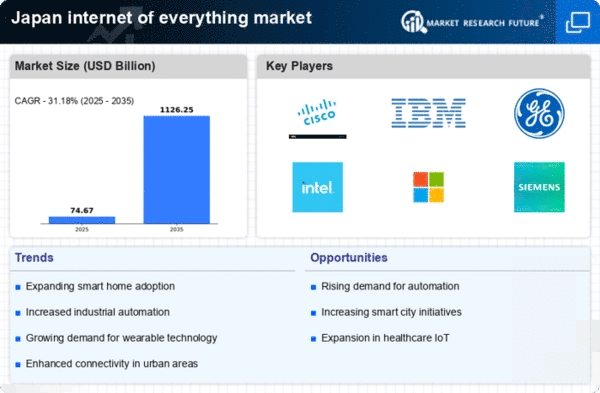Rising Demand for Connectivity
The increasing demand for connectivity in Japan is a pivotal driver for the internet of everything market. As urbanization accelerates, the need for seamless communication between devices becomes paramount. The Japanese government has been investing heavily in infrastructure to support 5G networks, which are expected to cover 90% of the population by 2025. This enhanced connectivity facilitates the integration of smart devices across various sectors, including transportation and home automation. Furthermore, the proliferation of IoT devices is projected to reach 1 billion units by 2025, indicating a robust growth trajectory. This demand for connectivity not only enhances user experience but also drives innovation in the internet of-everything market, as companies strive to develop solutions that leverage this interconnectedness.
Increased Focus on Sustainability
Sustainability has emerged as a significant driver for the internet of everything market in Japan. With growing concerns over climate change and resource depletion, businesses are increasingly adopting IoT solutions to enhance energy efficiency and reduce waste. For example, smart grids and energy management systems are being implemented to optimize energy consumption in urban areas. The Japanese government aims to achieve a 26% reduction in greenhouse gas emissions by 2030, which necessitates the adoption of innovative technologies. This focus on sustainability not only aligns with global environmental goals but also presents lucrative opportunities for companies operating in the internet of-everything market, as they develop solutions that contribute to a greener future.
Consumer Adoption of Smart Devices
The growing consumer adoption of smart devices is a key driver for the internet of everything market in Japan. As technology becomes more accessible, households are increasingly integrating smart home devices, such as smart speakers, thermostats, and security systems. Recent surveys indicate that over 50% of Japanese households own at least one smart device, reflecting a shift in consumer behavior towards automation and convenience. This trend is further supported by the rise of e-commerce platforms, which facilitate the purchase of IoT products. As consumers become more familiar with these technologies, the demand for interconnected devices is likely to surge, propelling growth in the internet of-everything market and encouraging manufacturers to innovate and expand their product offerings.
Advancements in Artificial Intelligence
The integration of artificial intelligence (AI) into the internet of everything market is transforming how devices interact and operate. In Japan, AI technologies are being utilized to enhance data analytics, enabling smarter decision-making processes across various sectors. For instance, AI-driven predictive maintenance solutions are being adopted in manufacturing, reducing downtime and operational costs. The market for AI in IoT is expected to grow at a CAGR of 25% through 2025, indicating a strong trend towards automation and efficiency. This synergy between AI and IoT not only improves operational capabilities but also drives innovation within the internet of-everything market, as companies seek to leverage these technologies for competitive advantage.
Government Support and Policy Frameworks
Government initiatives play a crucial role in shaping the internet of everything market in Japan. The administration has established various policies aimed at fostering technological advancements and encouraging investment in IoT solutions. For instance, the 'Society 5.0' initiative aims to create a super-smart society by integrating cyberspace with physical space. This vision is supported by funding programs that allocate approximately $1 billion annually to promote research and development in IoT technologies. Additionally, regulatory frameworks are being developed to ensure data security and privacy, which are essential for consumer trust. Such government backing not only stimulates market growth but also attracts foreign investments, further enhancing the internet of-everything market landscape.
















